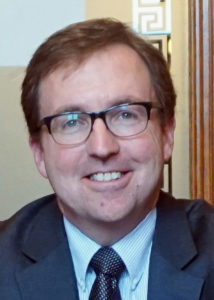By Tom Chapman
For The Catholic Messenger
As of April 18, Iowa lawmakers aren’t getting paid, but the legislative session will continue as the House and Senate work out their tax reform plans and the state budget. The House began work April 17 on some of budget-related bills.

A Senate proposal is expected to cut personal and corporate income taxes by about $2 billion over five years. The House plan would cut individual income taxes by about $1.3 billion over five years.
The ICC is pleased to see that both the Senate and House bills “couple” with the federal tax reform bill by expanding Iowa’s 529 plan to include nonpublic K-12 school tuition. Parents could put some money into the 529 accounts and pay their tuition bill out of the 529 account. This will help many private school parents save some money on their tax bills.
Iowa’s annual general fund budget is a little over $7 billion. A key question is whether tax cuts of the magnitude being discussed will allow adequate revenues for public education, Medicaid, public safety, a strong safety net and other acts of government essential to the common good.
The ICC opposes House File 2485, which would create a new form of high-interest lending in Iowa. Under the bill, for a $1,000 loan due in 12 months, lenders would collect more than double what they lend, at an interest rate of more than 200 percent. Many customers would be unable to repay their debt on time and would have to choose between default and borrowing more money. This cycle dramatically increases the likelihood of diminished household budgets and interventions by the state or extended family.
The ICC was also disappointed that Gov. Kim Reynolds signed the immigration enforcement bill, Senate File 481, last week. The Catholic bishops of Iowa had sent a letter to the governor asking for a veto.
In a statement regarding the bill, the bishops said, “Our energy, therefore, should be directed toward finding a solution so that immigrants are welcome here, and as a consequence, strengthen our communities with their families, enrich our social fabric by their faith and their cultural heritage, and provide a good and stable workforce.
“As we move forward, we Christians are bolstered by the hope of Christ this Easter season. It is He who taught: ‘Come you who are blessed by my Father. Inherit the kingdom prepared for you from the foundation of the world. I was … a stranger and you welcomed me.’ The Good Samaritan presents a wonderful model of a disciple of Christ. He alone stops to minister to the stranger in urgent need along the wayside.”
National Guard at the border
Bishop Joe Vásquez, chairman of the U.S. Conference of Catholic Bishops (USCCB) Committee on Migration, has issued a statement in support of the Southern Border Bishops and in response to the Administration’s recent actions. It reads, in part:
“On behalf of the USCCB Committee on Migration, I fully affirm the concerns voiced by the U.S. bishops of the southern border regarding the presence of the National Guard at the U.S./Mexico border. Current law entitles those fleeing persecution and arriving in our country to due process as their claims are reviewed. As the border bishops state: ‘Seeking refuge from persecution and violence in search of a peaceful life for oneself and one’s family is not a crime.’ Our faith calls us to respond with compassion to those who suffer and seek safe haven; we ask our government to do the same as it seeks to safely and humanely secure the border.”
Pope Francis issues new apostolic exhortation
Cardinal Daniel DiNardo, Archbishop of Galveston-Houston and President of the USCCB, is welcoming the release of Pope Francis’ apostolic exhortation, “Gaudete et Exsultate” (Rejoice and Be Glad), subtitled “On the Call to Holiness in the Contemporary World.”
Cardinal DiNardo said that one paragraph in particular (No. 115) points out the continuing need we have for civility in all our interactions, especially in the media. “‘Christians too,’ the Holy Father writes, ‘can be caught up in networks of verbal violence through the internet and the various forums of digital communication.’ This can be true even in Catholic media. Even in our heated disagreements with one another, we always need to remember that it is God who judges, not man (James 4:12).”
The Vatican has posted the exhortation online at: https://tinyurl.com/y8cogjnt.








